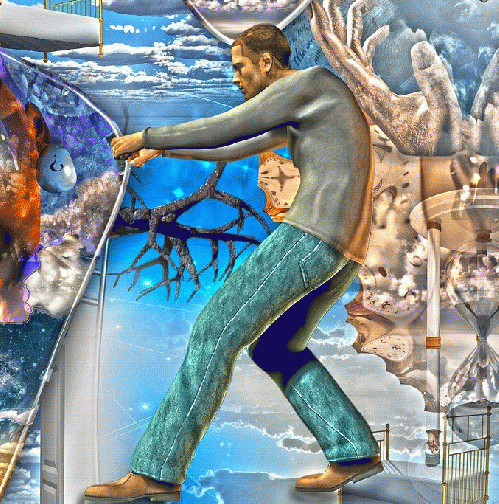>
Men
occasionally stumble over the truth, but most of them pick themselves up and
hurry off as if nothing ever happened -- Winston Churchill.
We fear and hate many of truth's disclosures because
they're often accompanied by narcissistic insults. What's a narcissistic insult? It's a bulletin
from reality that, while capable of smartening us up, offends our ego. To avoid
such insults, we cling to our illusions and limit our intelligence and inner
freedom.
History records how truth has threatened our
self-regard. People of the 16th Century ignored the new scientific
findings and clung to their ego-gratifying illusion that the earth was the
center of the universe. In the 19th Century, Charles Darwin
delivered a narcissistic insult when he considered the likelihood that man had
descended from ancient apes, a prospect that horrified the proud architects of
the Industrial Age. Four decades later, another profound narcissistic insult
was leveled when Sigmund Freud contended, in The Interpretation of Dreams, that much of our mental and emotional
life at any given moment is unconscious. Our ego, that self-centered me that pretends to know us intimately,
was gravely insulted. George Bernard Shaw remarked soon afterwards: "All great
truths begin as blasphemies."
The evasion of truth has many modern equivalents, one
being our denial of the fact that our methods of producing and using energy are
sickening our planet. We slip and slide around this idea. Deep inside, we whisper
to ourselves: "If global warming is a real threat to future generations, what
does that make me? Does my indifference to my carbon footprint make me an
accomplice in mass destruction? No, that's not me! That's not the kind of
person I am!"
Many of us embrace the idea that we're rugged
self-sustaining individuals rather than participants in a delicate web of life.
Preening individualism is naked narcissism, a byproduct of our repressed fear
of being insignificant or unworthy. Our esteemed self-delusion resists unlocking its defenses when its assumptions
are challenged. Studies
have found that misinformed people, particularly those loyal to their politics,
rarely change their minds when exposed to corrected facts in news stories.
Instead, they often become more strongly set in their beliefs, refusing to
digest even the smallest fragments of truth.
This restriction of intelligence may be humankind's most baffling and
self-destructive problem. The world's complex challenges won't be solved by
stubborn brains cells revolting against reality.
Our anxiety begins in the depths of our psyche where inner
weakness makes the unknowns of life more frightening. We tend to create an
identity--an idealized sense of ourselves as individuals or as a group--that's
based on fixed beliefs. Those beliefs can be religious, secular, personal,
cultural, and social, and they carry a lot of emotional baggage. When we stay
on the surface of awareness, we use beliefs as a substitute for an emotional
foundation in our own being, our own self. Emotionally, we're needy: we need
our beliefs to be true. Our emotional neediness asserts, "I believe it,
therefore it's true." Typically, such beliefs are designed to allay our fears
and bolster our sense of value and significance.
Not surprisingly then, many of us experience anxious, inner turmoil when
our beliefs are directly challenged by opposing ideas and beliefs (or, even
more distressingly, by facts). We can
feel a frightening cognitive dissonance when facts undermine our belief system.
The emotional impact might be, "Who am I, who will I be, without my beliefs?"
The ground seems to give way beneath us, and we're cast out into the unknown
like A Space Odyssey
nursling floating in an orb of light.
We downsize the mystery of life and package it into bite-sized
convictions. Psychologically, we're still children who fear spooks
hiding under our bed. To avoid feeling overwhelmed, we close our minds and refuse
unconsciously to accept inconvenient facts. Unconsciously, we feel that, "My
beliefs protect me from so-called facts that try to undermine me and cause
self-doubt. I've figured out my beliefs for myself, and nobody's so-called
facts are going to take them away." Our unrecognized stubbornness produces an
illusion of certainty, safety, substance, and power.
To be strong, we need to become more comfortable with uncertainty. With
greater emotional strength, we can accept--sometimes even embrace--the emptiness and uncertainty that permeate existence like
an invisible dark energy. Mystics say that highest wisdom and sense of freedom
come to us as we're able to transcend our personal self and merge our
consciousness with oneness. Now we have the best of both worlds, the richness
of our individual self along with the pleasure of transcending our aloneness. Yet
this option is resisted because it undermines individualism, that precious
illusion of an ego-based self that's maintained by inner fear.
Deep down, we identify with a limited self. We believe in our own
unworthiness, and we fear the revelation of this inner truth, even though its
exposure leads to peace and freedom. The healthier we become psychologically,
the more we "know" ourselves and are comfortable with ourselves through human
virtues such as integrity, honesty, empathy, generosity, courage, and a concern
for truth. Old beliefs disappear, replaced by the knowing of our goodness and
value and by the freedom of our spirit.
Typically, our intelligence is impeded or clouded over by fear of inner truth
and by the accompanying emotional issues such as low self-esteem, depression,
and anxiety. An unconscious process of repression is active in our psyche,
covering up old material from our past that's painful, shameful, and
guilt-laden. Mental energy, which ideally is used productively and creatively,
is wasted in the unconscious repression that fear of truth necessitates.
Mental energy is also wasted in inner defensiveness that protects a
delicate, idealized self-image or ego. Truth and reality are sacrificed as we
concoct defenses that cover up the most feared and hated truth of all--the
mind-blowing realization of the extent of our unconscious participation in
suffering and self-defeat. We proceed to uncover such truth as we expose our
self-deception and our fear of our better self.





